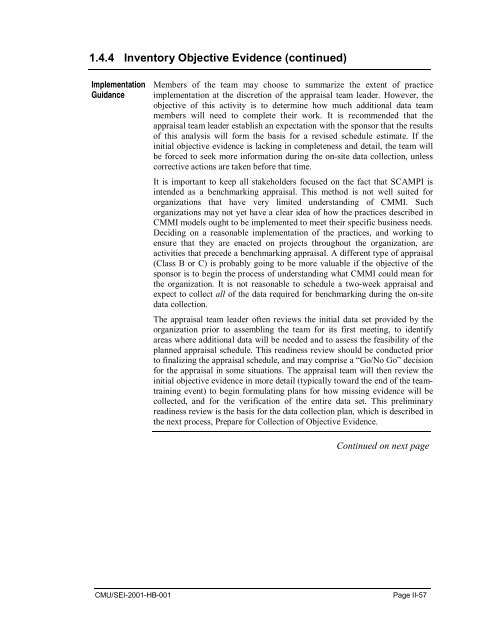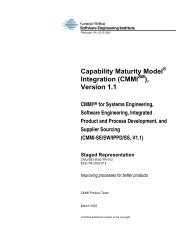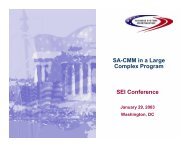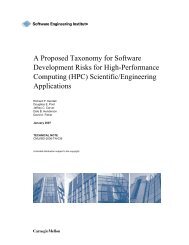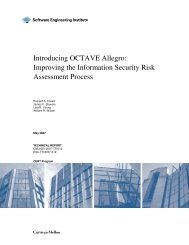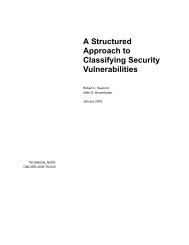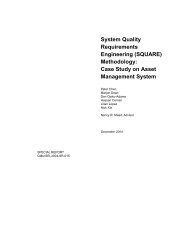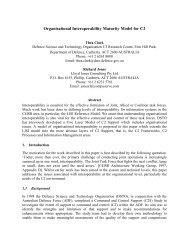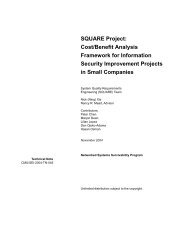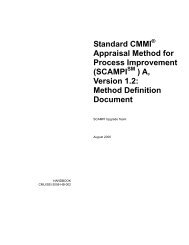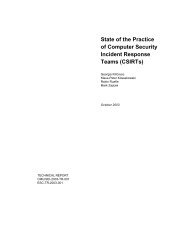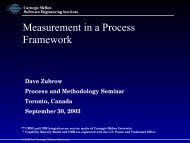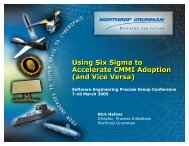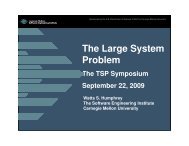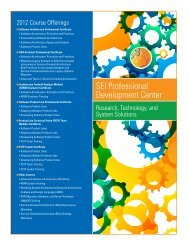Standard CMMI Appraisal Method for Process Improvement (SCAMPI)
Standard CMMI Appraisal Method for Process Improvement (SCAMPI)
Standard CMMI Appraisal Method for Process Improvement (SCAMPI)
You also want an ePaper? Increase the reach of your titles
YUMPU automatically turns print PDFs into web optimized ePapers that Google loves.
1.4.4 Inventory Objective Evidence (continued)<br />
Implementation<br />
Guidance<br />
Members of the team may choose to summarize the extent of practice<br />
implementation at the discretion of the appraisal team leader. However, the<br />
objective of this activity is to determine how much additional data team<br />
members will need to complete their work. It is recommended that the<br />
appraisal team leader establish an expectation with the sponsor that the results<br />
of this analysis will <strong>for</strong>m the basis <strong>for</strong> a revised schedule estimate. If the<br />
initial objective evidence is lacking in completeness and detail, the team will<br />
be <strong>for</strong>ced to seek more in<strong>for</strong>mation during the on-site data collection, unless<br />
corrective actions are taken be<strong>for</strong>e that time.<br />
It is important to keep all stakeholders focused on the fact that <strong>SCAMPI</strong> is<br />
intended as a benchmarking appraisal. This method is not well suited <strong>for</strong><br />
organizations that have very limited understanding of <strong>CMMI</strong>. Such<br />
organizations may not yet have a clear idea of how the practices described in<br />
<strong>CMMI</strong> models ought to be implemented to meet their specific business needs.<br />
Deciding on a reasonable implementation of the practices, and working to<br />
ensure that they are enacted on projects throughout the organization, are<br />
activities that precede a benchmarking appraisal. A different type of appraisal<br />
(Class B or C) is probably going to be more valuable if the objective of the<br />
sponsor is to begin the process of understanding what <strong>CMMI</strong> could mean <strong>for</strong><br />
the organization. It is not reasonable to schedule a two-week appraisal and<br />
expect to collect all of the data required <strong>for</strong> benchmarking during the on-site<br />
data collection.<br />
The appraisal team leader often reviews the initial data set provided by the<br />
organization prior to assembling the team <strong>for</strong> its first meeting, to identify<br />
areas where additional data will be needed and to assess the feasibility of the<br />
planned appraisal schedule. This readiness review should be conducted prior<br />
to finalizing the appraisal schedule, and may comprise a “Go/No Go” decision<br />
<strong>for</strong> the appraisal in some situations. The appraisal team will then review the<br />
initial objective evidence in more detail (typically toward the end of the teamtraining<br />
event) to begin <strong>for</strong>mulating plans <strong>for</strong> how missing evidence will be<br />
collected, and <strong>for</strong> the verification of the entire data set. This preliminary<br />
readiness review is the basis <strong>for</strong> the data collection plan, which is described in<br />
the next process, Prepare <strong>for</strong> Collection of Objective Evidence.<br />
Continued on next page<br />
CMU/SEI-2001-HB-001<br />
Page II-57


